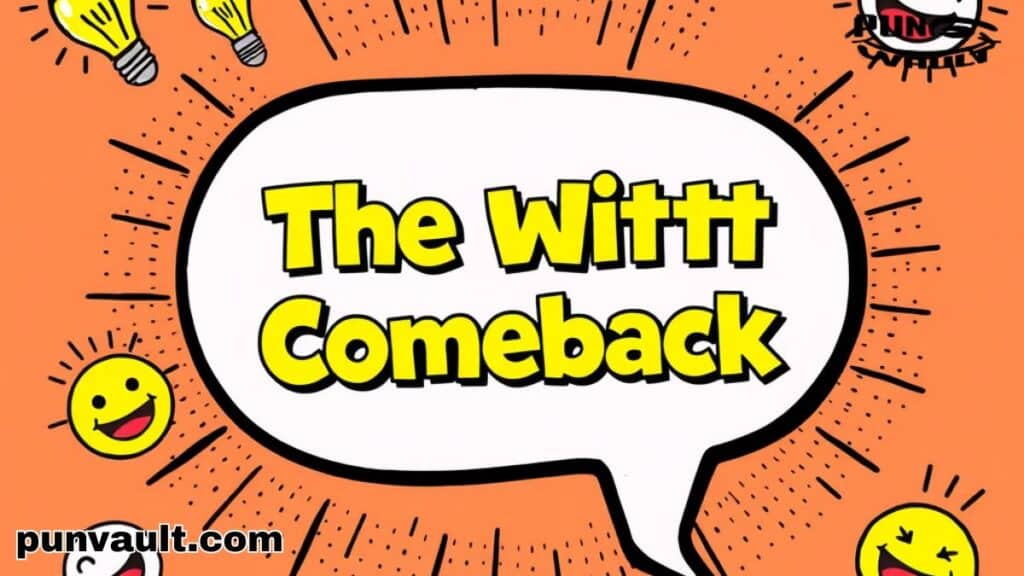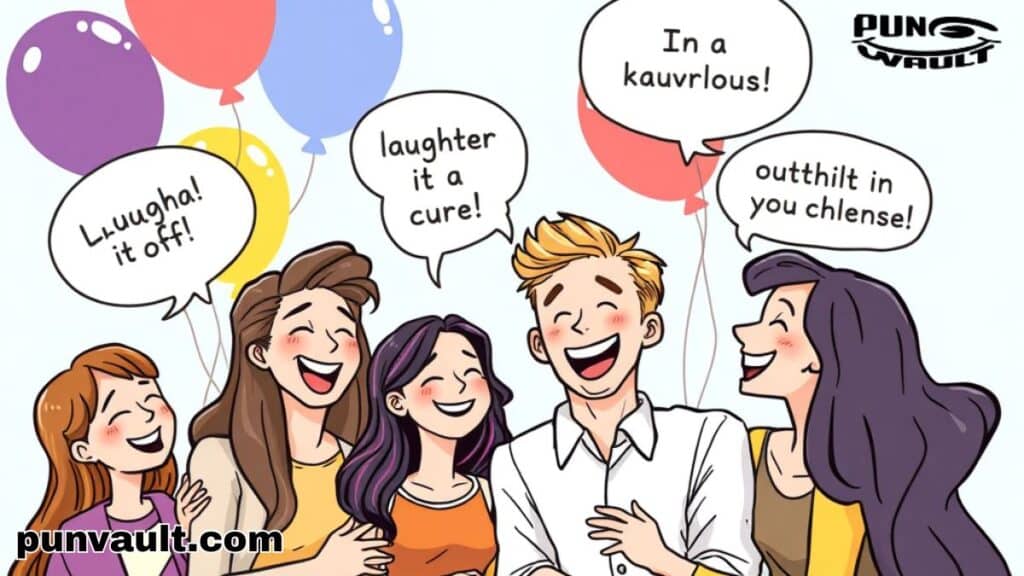25 Things to Say When Someone Laughs At You represents a comprehensive collection of strategic responses designed to help you navigate those uncomfortable moments when unexpected laughter catches you off guard. These carefully crafted replies transform potentially embarrassing situations into opportunities to showcase your confidence and emotional intelligence.
Picture yourself sharing an important idea when someone bursts into laughter at your expense. Your cheeks burn, your mind goes blank, and that familiar sting of embarrassment washes over you. Most people either freeze up or lash out defensively, both reactions that damage relationships and chip away at self-esteem.
Mastering these 25 strategic responses transforms you from someone who dreads unexpected laughter into a person who welcomes these moments as chances to shine, building social confidence and emotional resilience.
Understanding the Different Types of Laughter
Not all laughter means the same thing. Before choosing your response, you need to read the situation correctly. Laughter context matters enormously in determining the best way forward.
Malicious vs. Nervous vs. Genuinely Amused
Genuine amusement often comes with relaxed body language, eye contact, and a warm tone. The person might be laughing because you said something unexpectedly funny or made a harmless mistake. This type of laughter usually doesn’t carry malicious intent.
Nervous laughter happens when people feel uncomfortable or don’t know how to react. You’ll notice forced smiles, fidgeting, or quick glances away. This often occurs in formal situations where someone doesn’t want to appear rude but feels awkward about what just happened.
Mocking behavior shows itself through cold laughter, eye-rolling, or comments designed to belittle. The person’s body language appears closed off, and their tone carries an edge of superiority or cruelty.
Learning to distinguish between these types helps you choose appropriate responses to laughter that match the situation’s emotional temperature.
Situational Context Breakdown
Professional settings require different approaches than casual hangouts with friends. In workplace scenarios, maintaining credibility and professional boundaries becomes crucial. Your response needs to demonstrate competence while addressing the situation appropriately.
Social gatherings offer more flexibility for playful or humorous responses. Group dynamics in these settings often reward quick wit and self-assurance. However, you still want to maintain respectful interactions and avoid escalating tension.
Family dynamics present unique challenges because relationships run deeper and last longer. Teasing between siblings or relatives often carries different meanings than laughter from strangers or colleagues.
Online interactions create their own complications. Without body language or tone cues, digital communication makes it harder to interpret intent. Your written response becomes permanent, potentially affecting your online reputation.
The 25 Power Responses
The Confident Deflection
These responses acknowledge the laughter while maintaining your dignity and steering the conversation forward.
1. “Glad I could brighten your day!” This response shows emotional intelligence by assuming positive intent. It demonstrates confidence while keeping the mood light and friendly.
2. “I’ll be here all week – tip your waiters!” A classic deflection technique that uses humor to deflect awkwardness. It shows you’re comfortable with yourself and can laugh along without taking things personally.
3. “That’s the reaction I was going for.” This assertive statement implies you were intentionally being funny or dramatic. It reframes the situation as planned rather than accidental.
4. “Mission accomplished – making people smile is my specialty.” A positive reaction that positions you as someone who brings joy to others. It transforms potential embarrassment into a personality strength.
5. “I live to entertain!” Short, sweet, and confident. This response suggests you’re comfortable being the center of attention and don’t mind if others find amusement in your actions.
The Witty Comeback

These responses use humor and intelligence to redirect the energy while showcasing your quick thinking.
6. “If I charged admission for this show, I’d be rich by now.” A clever reply that acknowledges you’re providing entertainment while suggesting your performance has value. It shows self-confidence and humor.
7. “Save some energy – the real comedy starts later.” This response promises more entertainment to come while suggesting the current moment was just a warm-up. It maintains anticipation and keeps you in control.
8. “I see my reputation precedes me.” A playful way to suggest you’re known for being amusing or unpredictable. It shows you’re comfortable with your image and not defensive about it.
9. “Thanks for the review – I’ll work on my material.” This response treats the laughter as feedback on a performance, showing you can take criticism gracefully while maintaining a humorous perspective.
10. “You laugh now, but wait until you hear what I say next.” A forward-looking response that builds anticipation while suggesting you’re just getting started. It keeps the conversation moving and maintains your confidence.
The Curious Inquiry
These responses seek understanding while maintaining respectful dialogue. They work well when you genuinely don’t understand why someone found something funny.
11. “What specifically struck you as funny?” A direct question that invites explanation without sounding defensive. It shows emotional maturity and genuine curiosity about the other person’s perspective.
12. “Care to share what’s so amusing with the rest of us?” This response works well in group settings where one person’s laughter seems out of place. It gives them a chance to explain while keeping things inclusive.
13. “I’m genuinely curious – what made that laugh-worthy?” The word “genuinely” emphasizes your sincere interest in understanding their perspective. It opens dialogue rather than shutting it down.
14. “Help me understand the joke from your perspective.” This response assumes there’s a valid reason for their amusement and asks for clarification. It shows respect for their viewpoint while seeking clarity.
15. “Is there context I’m missing here?” A humble way to ask for more information without admitting fault or feeling embarrassed. It suggests you’re open to learning and understanding different viewpoints.
The Boundary-Setting Response
When laughter crosses into disrespectful territory, these responses establish limits while maintaining professional composure.
16. “Let’s keep things constructive, shall we?” A polite but firm way to redirect the conversation toward productive ends. It works particularly well in professional settings.
17. “I’d prefer we focus on the actual discussion.” This response acknowledges the laughter without engaging with it, then redirects attention to the matter at hand. It shows assertiveness without aggression.
18. “That’s enough of that – let’s move forward.” A clear boundary-setting statement that doesn’t invite argument. It demonstrates leadership and conversation control.
19. “I’m not sure what’s funny, but let’s stay professional.” Perfect for workplace scenarios where maintaining professional boundaries is essential. It addresses inappropriate behavior without escalating conflict.
20. “We can disagree without the theatrics.” This response suggests the laughter is performative rather than genuine, calling out inappropriate behavior while offering a path forward.
The Philosophical Pivot

These responses use the moment to make broader points about human nature, perspective, or communication.
21. “Different perspectives make life interesting, don’t they?” A thoughtful response that frames diversity of viewpoints as valuable. It shows emotional intelligence and maturity.
22. “Everyone processes information differently – that’s human nature.” This response normalizes differences in reaction while maintaining dignity. It demonstrates understanding of social dynamics.
23. “I stand behind my point, even if it sounds unconventional.” A confident assertion of your position that doesn’t back down from your original statement. It shows integrity and self-assurance.
24. “Sometimes the best ideas seem absurd at first.” This response reframes your statement as potentially innovative rather than foolish. It shows confidence in your thinking.
25. “I’d rather be authentic than universally accepted.” A powerful statement about personal values that positions authenticity as more important than approval. It demonstrates strong self-confidence.
The Psychology Behind Effective Responses
Why Confidence Trumps Defensiveness
Defensive responses often escalate situations and make you appear insecure. When you react defensively, you’re essentially confirming that the laughter bothered you, which can encourage more of the same behavior.
Confident responses, on the other hand, demonstrate emotional resilience and self-assurance. They show that you’re comfortable with yourself and not easily rattled by others’ reactions. This often earns respect and can actually improve your social standing.
Mirror neurons in our brains cause us to unconsciously mimic the emotional states of people around us. When you respond with confidence and humor, others tend to mirror that positive energy, improving the overall atmosphere.
Understanding Social Dynamics
Power dynamics play a crucial role in how laughter is perceived and received. In hierarchical situations like workplace environments, laughter from superiors might require different responses than laughter from peers or subordinates.
Cultural context also matters significantly. What’s considered respectful or appropriate varies widely between cultures, age groups, and social contexts. Understanding your audience helps you choose the most effective response.
Group pressure can turn innocent laughter into something more problematic. When one person laughs and others join in, the situation can escalate quickly. Your response can either defuse this mob mentality or unfortunately feed into it.
Response Strategy Selection Guide
| Situation Type | Best Response Category | Why It Works |
|---|---|---|
| Professional Meeting | Boundary-Setting or Philosophical | Maintains credibility and leadership |
| Casual Social Setting | Confident Deflection or Witty Comeback | Shows humor and relatability |
| Family Gathering | Curious Inquiry or Confident Deflection | Preserves relationships while addressing behavior |
| Online Interaction | Philosophical Pivot or Witty Comeback | Creates shareable, memorable content |
| Public Speaking | Confident Deflection or Witty Comeback | Recovers momentum and engages audience |
Advanced Response Techniques
Body language amplifies whatever words you choose. Maintain eye contact, keep your posture open and relaxed, and avoid defensive gestures like crossing your arms or stepping backward.
Voice tone matters as much as word choice. Speak clearly and calmly, avoiding both aggressive intensity and defensive quietness. Your tone should match your chosen response strategy.
Timing can make or break your response. A quick, confident reply often works better than a delayed comeback that seems rehearsed or overthought.
Follow-up strategies help you maintain momentum after your initial response. Have a plan for continuing the conversation naturally rather than letting awkward silence follow your comeback.
What NOT to Say
Certain responses consistently backfire and should be avoided:
Self-deprecating humor that goes too far can actually reinforce negative perceptions rather than deflecting them. Saying “Yeah, I’m pretty ignorant” doesn’t help your image.
Passive-aggressive comments like “Thanks for your support” create tension and make future interactions uncomfortable.
Angry outbursts or defensive attacks escalate conflict and can damage relationships permanently. Responses like “What’s your problem?” or “Stop being a jerk” typically make situations worse.
Overly complex explanations that try to justify why your original statement made sense often come across as desperate or insecure.
Specific Scenario Applications
The Workplace Presentation Gone Wrong
When you misspeak during a formal presentation and colleagues laugh, your response needs to maintain professional credibility while acknowledging the moment.
Best approaches:
- “Well, that wasn’t in my notes, but I’m glad I could add some unexpected entertainment to our morning.”
- “Let me try that again with more conventional terminology.”
- “I see I’ve discovered a new way to make budget meetings more interesting.”
These responses show confidence, acknowledge the mistake without dwelling on it, and redirect attention back to your content.
Social Media and Digital Environments
Online responses become permanent records that can be screenshot and shared. Choose responses that enhance rather than damage your digital reputation.
Effective strategies:
- Use humor that translates well in text
- Avoid responses that could be misinterpreted without tone cues
- Consider whether your response adds value to the conversation
- Remember that online interactions often have wider audiences than intended
Family Dynamics and Personal Relationships

Family interactions require special consideration because these relationships extend far beyond single moments. Your response should preserve long-term bonds while addressing immediate concerns.
Relationship-preserving approaches:
- Use gentler humor that shows affection alongside boundaries
- Ask for clarification when unsure about intent
- Address patterns of disrespectful behavior privately when possible
- Remember that family teasing often comes from love rather than malice
Building Long-Term Resilience
Developing Unshakeable Self-Confidence
True confidence comes from internal security rather than external validation. The more comfortable you become with yourself, the less others’ laughter can shake you.
Practical confidence-building strategies:
- Practice self-compassion when you make mistakes
- Develop expertise in areas important to you
- Surround yourself with supportive people who appreciate your authentic self
- Learn from each social interaction without obsessing over perfect responses
Mental Preparation Techniques
Visualization exercises can help you practice responses before situations arise. Imagine various scenarios and practice different response strategies in your mind.
Role-playing with trusted friends or family members helps you develop natural-sounding responses without the pressure of real social stakes.
Mindfulness practices help you stay present during awkward moments rather than getting caught up in anxiety about others’ opinions.
The Ripple Effect of Confident Responses
When you handle laughter with grace and confidence, you create positive ripples that extend beyond the immediate moment. Others notice your composure and respect your ability to stay calm under pressure.
Professional benefits include enhanced leadership perception, improved credibility, and stronger workplace relationships. Colleagues appreciate people who can handle unexpected situations with humor and grace.
Personal relationships deepen when people see you can handle teasing and unexpected moments without becoming defensive or hurtful. Friends and family members feel more comfortable being themselves around you.
Self-perception improves as you prove to yourself that you can handle social challenges confidently. Each successful interaction builds your emotional resilience for future situations.
Remember, the goal isn’t to have a perfect comeback every time someone laughs. It’s to respond in ways that maintain your dignity, preserve relationships, and demonstrate the kind of person you want to be. Confidence isn’t about never feeling awkward – it’s about feeling awkward and responding with grace anyway.
The 25 responses outlined here give you options for nearly any situation where someone laughs at you. Practice them, adapt them to your personality, and remember that the best response is often the one that feels most authentic to who you are.
Your ability to handle unexpected laughter says more about your character than whatever initially caused the amusement. Choose responses that reflect the confident, respectful, and emotionally intelligent person you aspire to be.
Conclusion
Mastering these 25 Things to Say When Someone Laughs At You transforms how you handle awkward moments forever. You’ll never again freeze up when unexpected laughter hits you. When Someone Laughs At You. These responses give you the power to turn embarrassing situations into moments that showcase your confidence and wit .When Someone Laughs At You. Practice them until they feel natural. When Someone Laughs At You. Remember that your reaction shapes the entire interaction. Choose responses that reflect the emotionally intelligent person you want to be. When Someone Laughs At You.
The beauty of these 25 Things to Say When Someone Laughs At You lies in their versatility and effectiveness across different situations. When Someone Laughs At You. Whether you’re in a professional meeting or casual conversation with friends, you now have tools to maintain your dignity. Your self-confidence will grow stronger with each successful interaction. When Someone Laughs At You. Others will respect your ability to handle pressure with grace. Most importantly, you’ll prove to yourself that you can navigate any social challenge that comes your way. These responses aren’t just words – they’re your pathway to unshakeable social confidence. When Someone Laughs At You.
FAQS
What should I say when someone laughs at me in a professional setting?
Use respectful responses like “Let’s keep things constructive” or “I’d prefer we focus on the actual discussion” to maintain credibility while addressing inappropriate behavior.
How do I respond to laughter without seeming defensive?
Choose confident deflection responses like “Glad I could brighten your day!” or witty comebacks that show you’re comfortable with yourself and can handle the situation gracefully.
Is it better to ignore laughter or respond to it?
Responding with confidence is usually better than ignoring it, as silence can be interpreted as weakness or hurt feelings, while a good response demonstrates emotional intelligence.
What’s the difference between malicious laughter and friendly teasing?
Malicious laughter comes with cold body language and cruel intent, while friendly teasing includes warm eye contact and playful tone without mean-spirited goals.
Can these responses work in online situations too?
Yes, but choose responses that translate well in text format and remember that online responses become permanent records that can be screenshot and shared.

Abdul Matloob is a wordsmith with a sharp eye for grammar and a playful love for puns. Blending linguistic precision with clever humor, he crafts content that delights language lovers and grammar geeks alike. Whether he’s breaking down the quirks of English grammar or delivering punchy puns that make readers groan and grin, Abdul Matloob turns language into both an art and a game.

